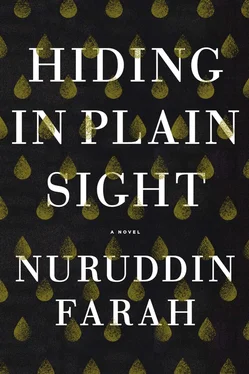“When have you ever had a problem with the alarm,” says Salif, impatiently. To Bella, he says, “Please let us set the alarm, Auntie.”
Now Dahaba’s voice begins to rise. “If the alarm is set, I panic and have no idea what to do. If the alarm goes off and armed security arrives at the gate and the guard lets them in and they find me alone, imagine what may happen — me alone with four armed men!” Bella senses that Dahaba knows how ridiculous she sounds, which only makes her more shrill and defensive.
Salif says, “Dahaba will be the death of us.”
Dahaba throws her hands in the air. “Do what you want,” she says, “if your conscience doesn’t tell you that you are doing something wrong.”
Bella tells Salif to set the alarm and turns to Dahaba. “As for you,” she says, “you may phone me at any time of day or night and I’ll be here to let you in or drive you back. Let this be the end of it.” She tells herself that all children benefit from a firm, fair hand.
—
It is Dahaba’s turn to sit in the front. Bella leaves Cawrala silent and gives Dahaba the task of guiding her to keep the children from arguing and keep their anxieties of whatever nature at bay. Bella is remembering her last encounter with Fatima, who took her to the airport on her last visit on a day when Aar was too busy to take her himself. Mahdi is five years Fatima’s senior. In the late seventies, he served as the editor of a Somali weekly before incurring the dictator’s wrath. He quit the country before he was detained and, together with a few close friends who had similarly fallen out of favor, set up a trucking business in Zambia. The business, which specialized in transporting everything from grains to vehicles to landlocked Zambia and Zimbabwe, did very well. Along the way, he met Fatima in Lusaka, and they married. Eventually, they relocated to Kenya, where the business did even better and where their children were born. Qamar and Zubair have never really known their parents’ country of birth, but Mahdi still publishes pieces on Somalia in the Kenyan press or for one of the many websites that have lately flourished. Now and then he toys with the idea of returning to Somalia and setting up an independent daily newspaper, but Fatima isn’t keen on throwing their hard-earned income into such a shaky venture. She wants her children to attend one of the best universities in the UK or the U.S. Bella is partial to Fatima, but she respects Mahdi’s sharp mind and generous heart.
Dahaba directs Bella onto a new four-lane highway that the Chinese have recently constructed. Then Dahaba looks at Salif in the rearview mirror and says, “Do you remember why we ended up with the Kariukis instead of with Auntie Fatima and Uncle Mahdi?”
Salif is shifting uncomfortably, but he replies, “It was bad timing. Auntie Fatima had to go into the hospital for a procedure. Qamar and Zubair were sent to stay at their cousins’ house for a few days.”
“How come you knew about that when I didn’t?”
A deadpan expression spreads itself like melting butter over Salif’s features. He says, “I don’t trade in gossip.”
Bella thinks about this. It’s true, she knows, that Dahaba has been accused numerous times of trading on family secrets, especially with Qamar and Zubair. She tells them both plainly that she hopes that neither of them will speak to others of what happened last night. “This is a family matter,” she says, “and I don’t wish you to spread it or trade in it.”
“Padmini is no family of mine,” Dahaba says.
“She is family as long as she is your mum’s partner,” Bella says, “and you must respect her as such. Nothing that occurs in the house gets repeated outside of it. Is that understood?”
“I won’t talk,” Dahaba remonstrates.
“Are you sure?” Bella says.
The question stings, and Dahaba falls into a stubborn silence. At length, she says, “Why don’t people believe me when I promise I won’t talk?”
Salif says, “He who tells his secrets will hardly keep those of others. Somalian proverb,” he adds, looking pleased with himself.
Bella says, “We believe you, darling. Relax.” She reaches over to pat her niece’s hand, but Dahaba moves it out of range, her expression sour.
—
Bella has just finished honking to attract the attention of the day guard when Dahaba is out of the car and banging on the gate, calling to the guard on duty to let them in. Bella shakes her head, amused by Dahaba’s suddenly reclaimed assertiveness. She glances at Salif to see if he shares her amusement, but he is absorbed in his mobile phone. Salif seldom reads, she notices, except when consulting the results of the latest soccer matches. When Dahaba was younger, Bella remembers, Aar used to tussle with her about reading in the back of the car in bad light. So far, her eyesight does not seem to have suffered. It just goes to show, Bella thinks, that adults worry themselves unnecessarily about children’s health and behavior.
The gate opens, and Dahaba runs into the complex, shouting her thanks to the guard, and Bella and Salif follow in the car. Inside are twenty or so semidetached houses, each with its own small patch of garden where the residents grow vegetables or roses. Bella halts to let a child collect an errant soccer ball. His mother takes him by the hand and pulls him out of the way, apologizing to Bella and berating him. This time Bella catches Salif’s eyes in the rearview mirror, and they both smile. The boy reminds them of Salif, who lived and breathed soccer when he was that age, dribbling and bouncing his ball against the walls of the house, inside and out, every waking moment, and falling asleep each night with the ball clutched to his chest. A proverb Hurdo often quoted, usually in reference to Bella’s own behavior, returns to her: It’s not the parent who chooses to favor a child, but the child who behaves in a way that compels a parent’s love. In this shared moment, Bella feels that she and Salif are confederates, coconspirators, working in tandem to look after Dahaba.
Bella likes the community feel to this complex, she realizes, as she brakes again to let two elderly Asian women cross to the other side of the road with the help of two African women. The scene reminds her of a family of elephants on their way to a watering hole, a sequence recalled from a nature documentary. Then that image gives way to a caravan of camels being led by a Somali herdsman. Ten meters on, her eyes fall on a white woman in the doorway of one of the houses, bending down to tie the shoelaces of a dark-skinned child, who is fidgeting and raring to be off.
Dahaba has already disappeared into Fatima and Mahdi’s house, which is at the end of the complex, a stand-alone two-family structure bigger than all the others. Bella parks in front, but she does not immediately get out.
“Who told you that Auntie Fatima was having a medical procedure?” she asks Salif.
“Dad did,” he says. “In fact, he left me a message saying it was the reason he was coming back from Somalia so suddenly. He said he planned to go straight to the clinic to visit her there.”
“And what was the procedure for?” Bella asks.
“Something to do with high breast density.”
“You even know the term for it, I am impressed.”
Salif hesitates. “I did a bit of research about it on the web too.”
“Any idea about the result?”
“I understand that the results of the tests were worrying enough that she’s lined up a specialist in England, at Barts, for a second opinion. She’s going there in a few months’ time.”
“And your dad told you all this?”
Salif nods, his look humbled in memory of his father.
Bella wonders what else he knows, remembering what Gunilla told her: that Aar trusted Salif with everything, including the passwords to his computers. She gives Aar credit for his trust and foresight, which have helped to prepare his son for the unfortunate position he now finds himself in. It’s a great pity that Valerie hasn’t the character or the humility to appreciate the traits Aar instilled in Salif.
Читать дальше












